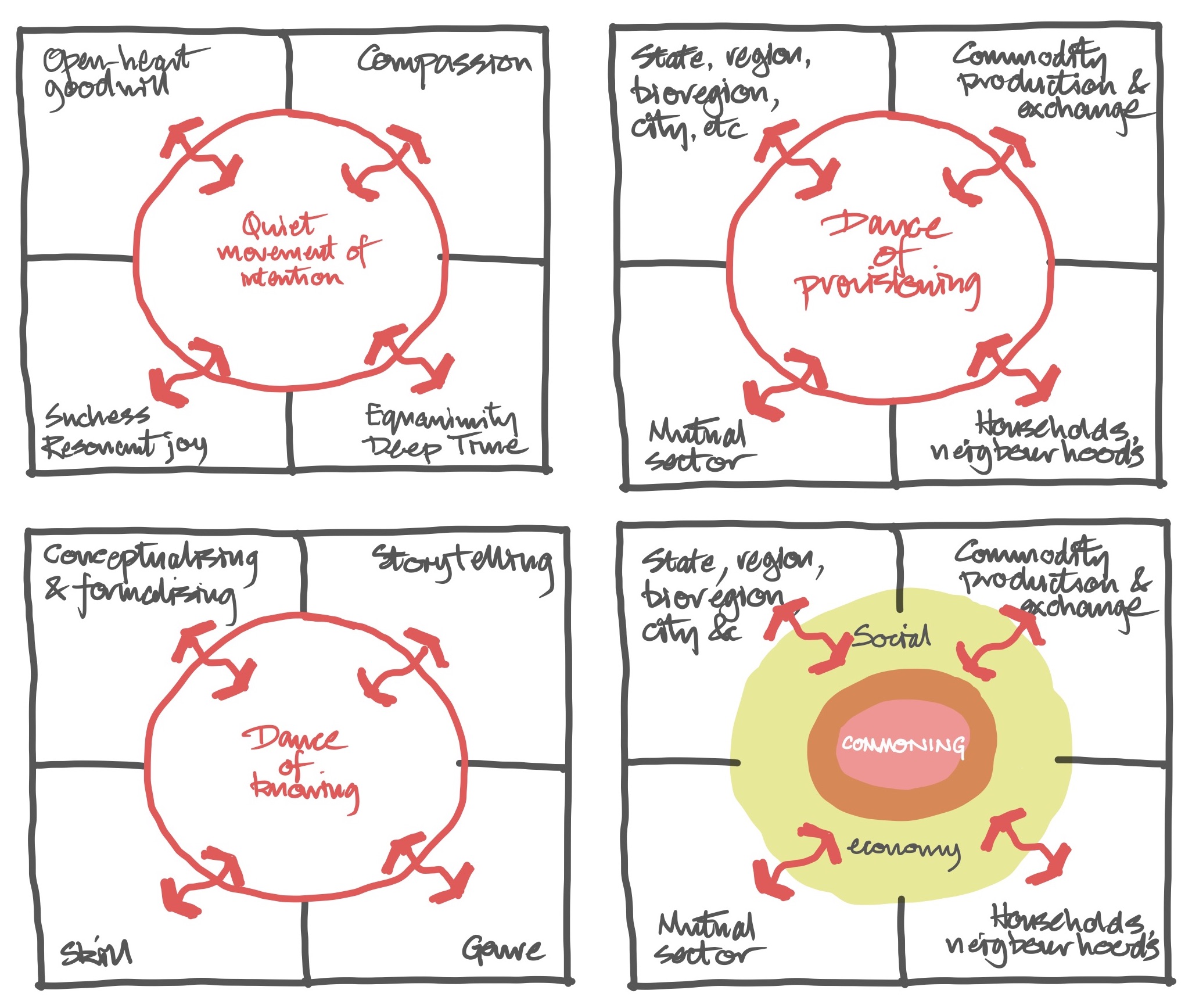Imagine . . **a cooperative dance company**, a performing arts coop, a company (with the degree of organisation and commitment that this implies) which becomes really very good at knowing what its ‘voice’ or vision is - its distinctive **aesthetic** .
The company understands how this aesthetic can be played out in dance, sustained from decade to decade in culture and organisation and workspace, all the time coproducing its work and insight, evolving its capability, bringing-on diverse choreographers from inside and outside, and steadily putting works ‘in repertoire’ so they can be called upon and referred to.
This is something like the college I think we need to make.
A coop like this will necessarily be a **school**, both in the sense that it has a way of apprenticing people into its recognised, evolved way of making dance, and also in the sense that it has an aesthetic, which differs from - maybe is in opposition to - other ‘schools’ of art.
>I’m thinking of companies or schools like Rambert, Laban, Pina Bausch, Nederlands Dans Teater.
The thing that these all are about, as dance companies or schools, is . .
- the **capability of performance** that enables them to contribute what they understand to be their distinct contribution to culture; and
- the **capability of ‘formacion’** that enables them to maintain and evolve that capability of performance, and also a continual influx of people inducted into that practice, and into contribution in that evolving aesthetic; and . . > Formacion is a core notion in the orientation of the college proposed here. For expansion see formacion
- the **venture-capability** to maintain the material fabric of the company, and the material livelihood of its members.
Now imagine . . a college which skilfully and rigorously cultivates that same kind of capability-of-formacion, to enable the fluent and powerful capability-of-performance . . of **activists in making the living economy**. This is the college I want to start talking about inOpen 2020.
I’m framing a scenario here, in which a skilful, persistent, self-aware, self-organised practice of cultural production (the college) facilitates its partner ventures (organisations that are committed in the economy of material means of living, rather than in cultural production) in a skilful practice of making-and-performing prefigurative **pieces of the fabric of a living economy**.
>It’s a fabric, because it’s a *weave* of durable threads of practice and durable stuff. It’s *a dance* because it’s constantly performed, in the flesh: played out into the continuous flow of events and experience. Whatever it is, that’s common between a weave and a dance, is at the core of what the college knows and does and is skilful in, in its working partnerships with social ventures in the living economy.
Metaphor aside, yes, its a college too. It pursues learning , and durable insights, and is skilled in this, and organised for this.
A college is a community of interacting, *mutually affiliated*, knowledgeable people, who cultivate *insights in common* and seek to **mobilise* the collective understanding to some effect . . to ‘perform’ the understanding into the mundane commerce of society. A college typically has faculties and schools, with distinct orientations to various aspects of the world.
These are all true of the college that I think is needed, to facilitate making the living economy.
>There is a difference between the dance company and a college in its familiar sense, and it’s something that’s essential in developing a college of making-in-society. >As a venture-of-knowing, what the dance company knows is a matter of doing things very well, according to a defining aesthetic, **in material performance**, under the constraints of gravity and space and time and bodily contingency and subsistence, as distinct from being sparkling or brilliant (or victorious) in debate or exegesis: **matters of language**.
The common ground of the dance school and the scholarly venture perhaps lies in conceptualisation and discipline, which both kinds of ventures rely upon, albeit in differing modes. ---
The dance metaphor - the dance coop metaphor - probably contributes more than the scholarly one. It's not casual, and it's not a game played around the playfully named DisCO model of coops (which is woven right into the proposal). There are some totally serious dances at the heart of the venture . .

DisCOs - Dancing the living economy
See A college
--- . . Leaving the imaging now, and down into the engine room. I need to open up a design discussion . . of - Pattern language(ing), - Commoning and - The organisational form of A college.